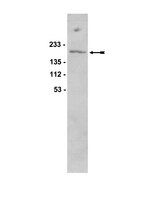STAT2 deficiency and susceptibility to viral illness in humans.
Hambleton, S; Goodbourn, S; Young, DF; Dickinson, P; Mohamad, SM; Valappil, M; McGovern, N; Cant, AJ; Hackett, SJ; Ghazal, P; Morgan, NV; Randall, RE
Proceedings of the National Academy of Sciences of the United States of America
110
3053-8
2013
概要を表示する
Severe infectious disease in children may be a manifestation of primary immunodeficiency. These genetic disorders represent important experiments of nature with the capacity to elucidate nonredundant mechanisms of human immunity. We hypothesized that a primary defect of innate antiviral immunity was responsible for unusually severe viral illness in two siblings; the proband developed disseminated vaccine strain measles following routine immunization, whereas an infant brother died after a 2-d febrile illness from an unknown viral infection. Patient fibroblasts were indeed abnormally permissive for viral replication in vitro, associated with profound failure of type I IFN signaling and absence of STAT2 protein. Sequencing of genomic DNA and RNA revealed a homozygous mutation in intron 4 of STAT2 that prevented correct splicing in patient cells. Subsequently, other family members were identified with the same genetic lesion. Despite documented infection by known viral pathogens, some of which have been more severe than normal, surviving STAT2-deficient individuals have remained generally healthy, with no obvious defects in their adaptive immunity or developmental abnormalities. These findings imply that type I IFN signaling [through interferon-stimulated gene factor 3 (ISGF3)] is surprisingly not essential for host defense against the majority of common childhood viral infections. | 23391734
 |
Molecular mechanisms of the decision between life and death: regulation of apoptosis by apoptosis signal-regulating kinase 1.
Matsuzawa, A and Ichijo, H
J. Biochem., 130: 1-8 (2001)
2001
概要を表示する
Coordination and balance between cell survival and apoptosis is crucial for normal development and homeostasis of multicellular organisms. Defects in control of this balance may contribute to a variety of diseases including cancer, autoimmune and neurodegenerative conditions. Although a large number of pro- and anti-apoptotic factors acting for or against the final death event have been and are being discovered at an extraordinary pace with the recent progress in this area, the molecular mechanisms determining whether a cell lives or dies are not fully understood. Phosphorylation and dephosphorylation of intracellular effector molecules are the most common and important regulatory mechanisms in signal transduction and control a variety of cellular events from cell growth to apoptosis. Apoptosis signal-regulating kinase 1 (ASK1) is a member of the mitogen-activated protein (MAP) kinase kinase kinase family, which activates both the SEK1-JNK and MKK3/6-p38 MAP kinase pathways and constitutes a pivotal signaling pathway in cytokine- and stress-induced apoptosis. This review provides recent findings on the molecular mechanisms which determine cell fate such as survival, proliferation, differentiation or apoptosis, with special focus on the regulatory mechanisms of ASK1-mediated apoptosis. | 11432772
 |
Laminar flow inhibits TNF-induced ASK1 activation by preventing dissociation of ASK1 from its inhibitor 14-3-3.
Liu, Y, et al.
J. Clin. Invest., 107: 917-23 (2001)
2001
概要を表示する
The inflammatory cytokine TNF-alpha stimulates several presumed pro-atherogenic signaling events in endothelial cells (ECs), including activation of c-Jun NH(2)-terminal kinase (JNK) and induction of E-selectin. Here, we show that apoptosis signal-regulating kinase 1 (ASK1), a MAP kinase kinase kinase, is required for TNF-mediated JNK activation. TNF activates ASK1 in part by dissociating ASK1 from its inhibitor 14-3-3. Because the risk of atherosclerosis is decreased in regions of steady laminar flow, we hypothesized that laminar flow inhibits proinflammatory cytokine-mediated activation of JNK. Steady laminar flow inhibited both TNF activation of ASK1 and JNK. Inhibition of ASK1 by flow correlated with increased association of ASK1 with 14-3-3. A constitutively active form of ASK1 lacking the 14-3-3-binding site (ASK1-Delta NS967A) was not inhibited by flow. These data establish ASK1 as a target for flow-mediated inhibition of cytokine signaling and indicate a novel role for 14-3-3 as an anti-inflammatory mediator in ECs. | 11285311
 |










